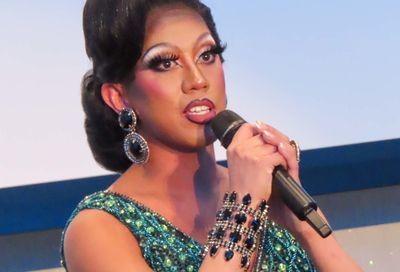Safe Sex
Alphabet Soup
June 26, 2003: It’s a great day to be a sodomite.
In the time line of our lives, this is a big one. They should put this date in bold. The Supreme Court’s ruling that struck down the Texas sodomy law on this day paves the way for everything in our sometimes-downtrodden gay world to change.
In my previous life as a journalist for the gay newspaper of record, I was part of an effort to document the history of our movement as it happened in the 1990s and the earliest part of this decade. While I reported and later edited the gay news of the day, I was hit time and time again by a harsh reminder: As long as the flawed, hypocritical, dehumanizing Bowers v. Hardwick decision of 1986 was left standing, upholding Georgia’s sodomy law, we would never stand a chance at getting everything we deserve in the way of equal rights.
I remember writing stories about the Sharon Bottoms custody case in Virginia in the mid-1990s, being outraged that a woman could lose her small son because her own mother took issue with her lesbianism. I was naively shocked that a state high court would actually cite the Supreme Court’s 10-year-old ruling in favor of a law that banned private consensual adult activity as the reason for denying her custody.
After a while, it stopped being shocking and started being annoying. Really, why did we care about sodomy laws? Who among us actually thought twice before expressing our intimate love or plain ol’ physical desire for a person of the same sex — just because we were in Virginia? Or Texas? Or Kansas, Missouri, Oklahoma, Idaho, Utah, either of the Carolinas, Mississippi, Louisiana, Alabama or Florida? Who stopped, before enjoying a romp in the gay hay, to check the statutes in any number of other states before they repealed or overturned their own hideous sodomy laws in the years leading up to this summer’s landmark ruling?
I think it’s safe to say that sodomy laws never mattered to most of us on a practical level, except when some judge or politician or anti-gay shrill would cite them as the reason to deny us something we deserved.
Maybe gay men feel differently, because when we hear of people being arrested for sodomy, they tend to be male people. I don’t remember ever hearing of a lesbian couple being arrested for sodomy (remember, the legal definition is more extensive than anal intercourse) and perhaps this gave me more of a feeling of invincibility than I ever should have had. I’ve always thought of these laws as severe nuisances that were screwing up my ability to get full civil rights, but not threatening my ability to enjoy whatever sexual configuration I wanted with a female partner, no matter where I was living or traveling.
Sometimes in my gay life, outside of those times when I was observing things from the safe distance of a reporter’s notebook, I’ve lost track of what matters in our movement, and the steps we need to take to get where we want to ultimately end up. I’ve considered civil rights legislation and full marriage rights our most important goals, forgetting that we need to find and lay out the edges of our big gay jigsaw puzzle in order to figure out how to make the bigger pieces fit.
The ruling against sodomy laws is like the biggest corner piece. Our pretty picture of civil liberties would never become complete without it in place.
I’ve heard talk about what this ruling means for our future, whether a ruling to invalidate state laws banning recognition of gay marriages will be the next big piece we find and secure. We can only hope that fairness and logic will prevail when that issue comes before the justices who have, finally, done something really right by us.
I’m reading a book right now that includes a small scene, set in the 1960s, where a black woman watches as Lyndon Johnson signs the 1964 Civil Rights Act into law. I read that scene a few days before the sodomy ruling came down and, without making any connections to the Supreme Court docket, found myself wondering for a second how something like that might feel. The character in this book is seeing history made and knows how fully it will change the world, but also knows that in the immediate days afterward, nothing will be different. Sure enough, she soon finds herself beaten and arrested for talking back to some white men who harass her on the street.
On June 26 I felt a piece of that character’s experience when a good friend e-mailed me the news that the Supreme Court had ruled in favor of equal rights for gays. I was dumbfounded at first, unsure of what to make of it all, sort of cringing as I read the media reports and wondering what shoe was going to drop in the next paragraph. And then, slowly, it occurred to me that sometimes the right thing happens, sometimes it even happens to my people, and this is one of those times.
I e-mailed a few important people to let them know too; later in the day I talked to my best friend, who worked with me in the gay journalism world for several years. She was vacationing on Martha’s Vineyard, away from all the wonkiness of Washington. I told her the news and she, too, was a bit flabbergasted. We joked how she’d have to go find a woman on the island to celebrate with.
For a minute it almost felt normal, this sudden granting of rights that we have pretty much been assuming all along, whether or not the laws of several states agreed with us. A few of us who used to work at the Blade were e-mailing during the day about lunch plans we happened to have, and one of the editors who worked for me — our token straight staffer — expressed that she, too, was taken aback by the ruling.
“It’s kind of a shame,” she wrote, “that it’s shocking when justice prevails.”
It is a shame. But it’s also good to be shocked sometimes, if this is what that means. By the time this appears in print, I hope my gay friends in Texas, Virginia, Kansas, Missouri, Oklahoma, Idaho, Utah, North Carolina, South Carolina, Mississippi, Louisiana, Alabama and Florida have celebrated appropriately. I hope the rest of us elsewhere have, at the very least, taken some time to reflect on how important this is to all of us.
I also hope my straight friends in some of the aforementioned states and around the country have realized that there is, herein, a victory for them, too — they can now feel free to enjoy the activities they’ve probably already been enjoying, whether they’re doing so within a state-sanctioned, federally recognized legal marriage or not.
Because her mother reads this column, Kristina Campbell neither confirms nor denies whether she ever took part in any of the activities recently made legal by the Supreme Court. “Alphabet Soup” appears biweekly and its prudish author can be reached at kcampbell@metroweekly.com.
Support Metro Weekly’s Journalism
These are challenging times for news organizations. And yet it’s crucial we stay active and provide vital resources and information to both our local readers and the world. So won’t you please take a moment and consider supporting Metro Weekly with a membership? For as little as $5 a month, you can help ensure Metro Weekly magazine and MetroWeekly.com remain free, viable resources as we provide the best, most diverse, culturally-resonant LGBTQ coverage in both the D.C. region and around the world. Memberships come with exclusive perks and discounts, your own personal digital delivery of each week’s magazine (and an archive), access to our Member's Lounge when it launches this fall, and exclusive members-only items like Metro Weekly Membership Mugs and Tote Bags! Check out all our membership levels here and please join us today!




















